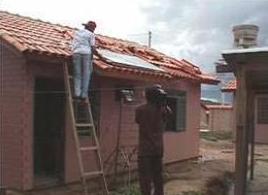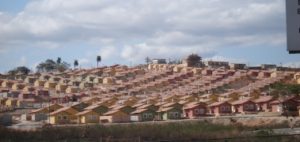Brazil: Lessons learned in Social Housing Projects with Solar Systems (2005)
December 17, 2009
Social housing project in Contagem, Brazil
 It was a highlight for the press in those days: In the year 2000, 100 out of the 800 families participating in the social housing project in Contagem, Brazil, received a solar water heater for their home. The tank of the thermosiphon systems was installed below the roof top.
It was a highlight for the press in those days: In the year 2000, 100 out of the 800 families participating in the social housing project in Contagem, Brazil, received a solar water heater for their home. The tank of the thermosiphon systems was installed below the roof top.
Photo: José Tomaz Vieira Pereira
In Brazil, the use of solar water heaters in social housing projects is already a reality. The path to solar housing, however, was full of detours and shortcuts – and consequently a lot of lessons learned. The story began in the early 2000s when the Pontifical Catholic University of Minas Gerais (PUC) implemented the first programme for solar water heaters in social interest housing via its Green Solar Laboratory, the referral center for solar thermal energy in Brazil.
The name of the project was the same as its location: Sapucaias, a housing area in the city of Contagem, 25 km from Belo Horizonte, capital of the state of Minas Gerais. Eletrobrás, one of the major power utilities in Brazil, provided the funds for it.
Solar water heaters were installed in 100 houses out of a total 800 houses participating in the project. This allowed researchers to compare homes with and without the installation of solar technology. The following table shows the summarized results after 5 years of monitoring energy and water bills. The complete study is part of a doctoral thesis published in 2006 (see the attached document in Portuguese).
| Families with solar water heater |
Families without solar water heater |
|
| Average monthly energy consumption |
81 kWh |
145 KWh |
| Average energy savings |
44 % |
0 % |
| Value of the monthly bill for electricity [US$] |
19 |
49 |
| Increase in monthly income [US$] |
30 |
0 |
The results were very promising. Households with solar water heaters were able to reduce their electricity consumption by 44 %, which corresponded to a monthly saving of US$ 30. Almost 70 % of all households had a family income between 1 and 2 minimum wages, which, at that time, amounted to approximately US$ 140. The families could therefore increase their monthly income by 21 %, which also meant an increase in the quality of life for them.
Despite these positive aspects, some difficulties arose that should be avoided in future solar projects for social housing. The first problem was the resident’s initial, but natural rejection of solar installations, only because solar was a new technology. Some residents, for example, believed that the water heated by the sun could cause skin cancer. Others were concerned that the technology would attract thunders, and so on.
Lesson 1: It had been necessary to hold a presentation in front of the entire community, including the children, before the initial rejection could be overcome. It is important that everyone understands that solar is the only appliance in the house, which will not consume energy, but produce free heat for many years instead.
Secondly, it became apparent that a small, but important number of families, who received a solar water heater at no cost, resold it quickly. At that time, solar panels cost at least US$ 600. The profit from selling these systems was more important to the families than the monthly savings of electricity.
Lesson 2: It is important that a solar heater is not donated to families, but financed over a 20-year period along with the house itself. The increase in the monthly payment to finance house and system is rather small compared to the cost savings of reduced electricity consumption.
This text was written by Carlos Faria Café, Director of SE–Studio Equinócio – Marca Solar Group based in Brazil.


